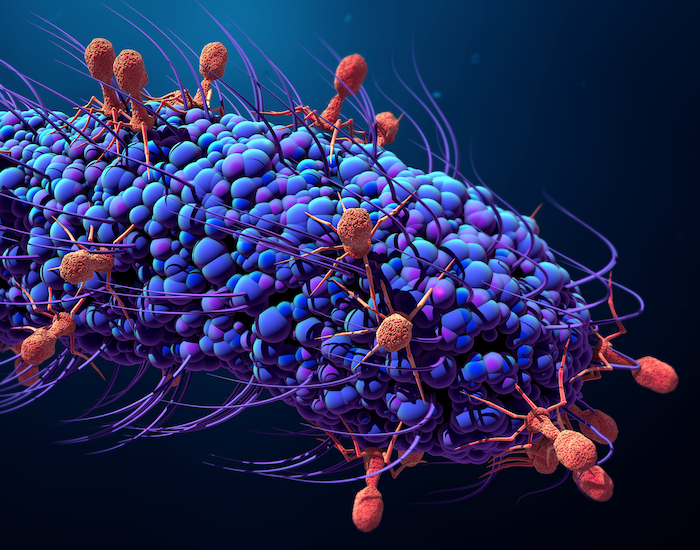 The gut microbiome is a complex, interconnected ecosystem of species. And, like any ecosystem, some organisms are predators and some are prey. A new study published in Cell Host & Microbe looked at the impact of bacteriophages – viruses that hunt, infect and kill bacteria. The study found that phages have a profound impact on the dynamics of the gut microbiome, not only affecting certain species directly, but also having a cascading effect on others. Phages may also be impacting their human host by modulating metabolites, including chemical substances found in the brain.
The gut microbiome is a complex, interconnected ecosystem of species. And, like any ecosystem, some organisms are predators and some are prey. A new study published in Cell Host & Microbe looked at the impact of bacteriophages – viruses that hunt, infect and kill bacteria. The study found that phages have a profound impact on the dynamics of the gut microbiome, not only affecting certain species directly, but also having a cascading effect on others. Phages may also be impacting their human host by modulating metabolites, including chemical substances found in the brain.
“One of the major interests in my lab is understanding the changes in the dynamics of the gut microbiome. Bacteriophage are a huge component of the microbiome but haven’t been studied much yet,” said co-corresponding senior author Georg Gerber, MD, PhD, MPH, co-director of the Massachusetts Host-Microbiome Center.
“Some people are exploring phage therapy, using phage to kill off microbes, but phage are also found naturally in the gut, co-existing with the rest of the ecosystem. We wanted to find out what they are doing in there.”
To address this question, the researchers colonized the guts of mice with a defined set of human bacterial species and then added phages. By tracking the growth of each microbe the team found, as expected, that the phages caused attritions of the species they preyed upon. They also discovered an unexpected rippling effect on the rest of the ecosystem, resulting in the growth of non-targeted species.
In addition to looking at the effects on microbes, the team also looked for effects on the metabolome – the chemical substances produced by both the host and the bacteria present. They found that when they modulated the microbiome with phages, they could see targeted changes in the metabolome, including changes in neurotransmitter levels and bile acids.
“This finding fascinates me for followup and raises significant questions: Could we use phage to modulate these activities?
“Could this be an intervention for conditions, such as depression, where you’d want to change neurotransmitter levels?” said Gerber. “Even if they aren’t used as a direct therapeutic, our study suggests that phage may be a good tool for understanding the potential effects of other therapeutics that alter the microbiome.”
Gerber and colleagues are especially interested in looking at the intersection of phage and malnutrition in the developing world, given the profound effects on the metabolome and microbiome that malnutrition can have.
Source: Bryan B. Hsu, Travis E. Gibson, Vladimir Yeliseyev, Qing Liu, Lorena Lyon, Lynn Bry, Pamela A. Silver, Georg K. Gerber. Dynamic Modulation of the Gut Microbiota and Metabolome by Bacteriophages in a Mouse Model. Cell Host & Microbe, 2019; DOI: 10.1016/j.chom.2019.05.001











